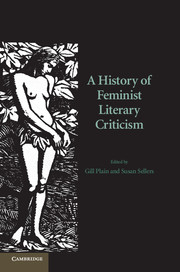Book contents
- Frontmatter
- Contents
- Acknowledgements
- Notes on contributors
- Introduction
- PART I PIONEERS AND PROTOFEMINISM
- Introduction to Part I
- 1 Medieval feminist criticism
- 2 Feminist criticism in the Renaissance and seventeenth century
- 3 Mary Wollstonecraft and her legacy
- 4 The feminist criticism of Virginia Woolf
- 5 Simone de Beauvoir and the demystification of woman
- PART II CREATING A FEMINIST LITERARY CRITICISM
- PART III POSTSTRUCTURALISM AND BEYOND
- Postscript: flaming feminism?
- Index
- References
1 - Medieval feminist criticism
Published online by Cambridge University Press: 05 June 2012
- Frontmatter
- Contents
- Acknowledgements
- Notes on contributors
- Introduction
- PART I PIONEERS AND PROTOFEMINISM
- Introduction to Part I
- 1 Medieval feminist criticism
- 2 Feminist criticism in the Renaissance and seventeenth century
- 3 Mary Wollstonecraft and her legacy
- 4 The feminist criticism of Virginia Woolf
- 5 Simone de Beauvoir and the demystification of woman
- PART II CREATING A FEMINIST LITERARY CRITICISM
- PART III POSTSTRUCTURALISM AND BEYOND
- Postscript: flaming feminism?
- Index
- References
Summary
MEDIEVAL FEMINIST LITERARY CRITICISM?
Was there such a thing as feminist literary criticism in the Middle Ages? Given that ‘feminism’ is the ideology of a modern social movement for the advancement of women, taking shape (in its Western European and US forms) in the eighteenth century and based on principles of equality and emancipation in secular societies, it could not have been known in, say, late fourteenth-century England in the forms in which it is known in the United States or Britain today – to say the very least. Moreover, given that ‘literary criticism’ is as well a modern invention, in English dating back to perhaps Alexander Pope, perhaps John Dryden, perhaps Sir Philip Sidney, it is hard to say what relation ‘medieval critical attitudes’ (Copeland, 1994: 500) might have to literary criticism – especially in its postmodern, feminist form in which the modernist pretence of analytical objectivity is abandoned for an ideologically based and politically committed project.
Yet writers in the late Middle Ages did reflect on the activities of reading, interpreting and writing, in a vigorous commentary tradition in Latin and a vibrant vernacular literary practice as well as in the prescriptive tradition of Latin rhetorical artes. Since originality was not the sine qua non of literature that it later became – a main priority of medieval thought was to articulate a tradition – a great deal of late medieval writing can be seen in fact to be rewriting.
- Type
- Chapter
- Information
- A History of Feminist Literary Criticism , pp. 11 - 26Publisher: Cambridge University PressPrint publication year: 2007
References
- 1
- Cited by



